TED Talk by Armando Azua-Bustos
How can Earth teach us about extraterrestrial life? In his TED Talk, The most Martian place on Earth, Dr. Armando Azua-Bustos takes us on a tour of the Atacama Desert, his childhood home now turned into his astrobiological laboratory. Searching for signs of life on Mars, or other planets, requires careful understanding of how organisms can survive in dry and extreme environments, and Dr. Azua-Bustos’ research helps to reveal the conditions that we might find life both there and elsewhere. […]
Read more
